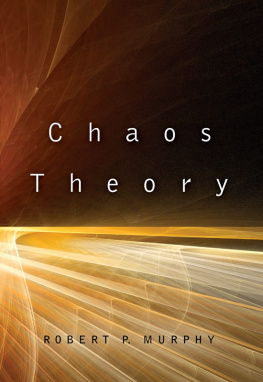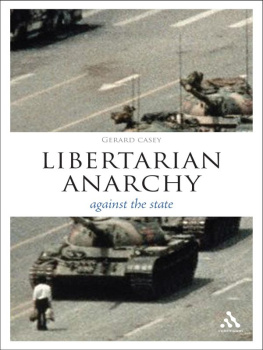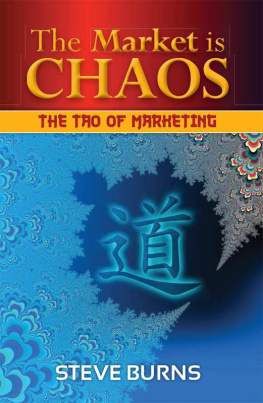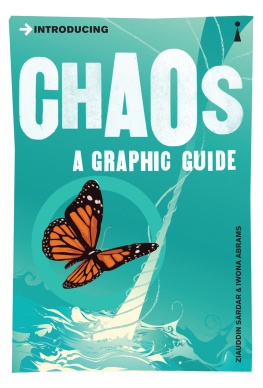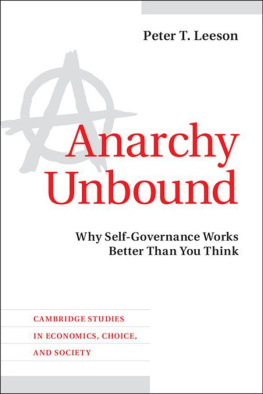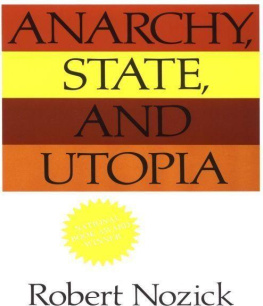Robert P. Murphy - Chaos Theory: Two Essays On Market Anarchy
Here you can read online Robert P. Murphy - Chaos Theory: Two Essays On Market Anarchy full text of the book (entire story) in english for free. Download pdf and epub, get meaning, cover and reviews about this ebook. year: 2002, publisher: RJ Communications LLC, genre: Politics. Description of the work, (preface) as well as reviews are available. Best literature library LitArk.com created for fans of good reading and offers a wide selection of genres:
Romance novel
Science fiction
Adventure
Detective
Science
History
Home and family
Prose
Art
Politics
Computer
Non-fiction
Religion
Business
Children
Humor
Choose a favorite category and find really read worthwhile books. Enjoy immersion in the world of imagination, feel the emotions of the characters or learn something new for yourself, make an fascinating discovery.
- Book:Chaos Theory: Two Essays On Market Anarchy
- Author:
- Publisher:RJ Communications LLC
- Genre:
- Year:2002
- Rating:3 / 5
- Favourites:Add to favourites
- Your mark:
- 60
- 1
- 2
- 3
- 4
- 5
Chaos Theory: Two Essays On Market Anarchy: summary, description and annotation
We offer to read an annotation, description, summary or preface (depends on what the author of the book "Chaos Theory: Two Essays On Market Anarchy" wrote himself). If you haven't found the necessary information about the book — write in the comments, we will try to find it.
Chaos Theory: Two Essays On Market Anarchy — read online for free the complete book (whole text) full work
Below is the text of the book, divided by pages. System saving the place of the last page read, allows you to conveniently read the book "Chaos Theory: Two Essays On Market Anarchy" online for free, without having to search again every time where you left off. Put a bookmark, and you can go to the page where you finished reading at any time.
Font size:
Interval:
Bookmark:
"Chao s Theory "
Rober t P . Murph y

b y Robert P. Murph y
With an Introduction b y Jeremy Sapienz a
Illustrations b y
RJ Communications LL C New Yor k
Copyright 2002 Robert P. Murphy
All rights reserved.
Published by
RJ Communications LLC 51 East 42 nd Street, Suite 1202 New York, NY 10017
This book is dedicated to those who believe government is a necessary evil: You're half right.
The following essays show that the two most crucial "functions" of government-law and defense-can be efficiently supplied on the free market. The State is thus shown to be completely unnecessary. Anarchy, the absence of coercive government, must not be confused with chaos.
Rather than engage in philosophical debates over values, I focus instead on the mechanics of "anarcho-capitalism" or "market anarchy," the only social system that respects the sanctity of property rights and contract. Rather than tackle the socialist ideal of equality, I offer the market anarchist ideal of equity.
I ultimately leave it to the reader to decide which systemState or market-is the better arrangement.
Bob Murphy
My intellectual debt in anarchist theory belongs, hands down, to the late great Murray Rothbard (1916-1995). More broadly, my view of how the world works is due primarily to that fount of wisdom, Ludwig von Mises treatise Human Action .
The original idea (and Introduction) for this book came from Jeremy Sapienza. Robert Vroman provided the wonderful (if somewhat disturbing) artwork that so mercifully interrupts the monotony of the text. Matt Pramschufer laid out the cover design.
Zach Crossen and Pete Johnson reviewed an early draft of this book. I am grateful for the kind remarks of Lew Rockwell and Gene Callahantwo modern-day heroes in the war of ideas featured on the back cover. I would like to thank the participants on anti-states Forum for their constant (if sometimes crude) criticism and questioning of my decidedly unorthodox views. Rachael Anne Fajardo played an indispensable role in providing constant encouragement and suggestions.
And finally I must thank Ron Pramschufer, and the rest of the staff at RJ Communications, for making it look like Ive published before.
RPM April, 2002
Table of Contents
So, Chaos Theory , huh? Yeah, its not actually about chaos theory, but it is a really cool title. And the book itselfmay be the most important to date on anarchist theory and its possible application to the real world.
When I first read the draft of Bobs book, I was blown away by the sheer simplicity of his arguments, something I think is lacking in much of the existing important anarchist literature. His simple explanations, a smart mixture of common sense and slimmed-down economic theory, provide a perfect starting point for the curious non-anarchist, or a fantastic finishing point for the committed anti-statist who has a few logistical doubts about the stateless society.
Ive known Bob for a while now, since way back when we were regular columnists on LewRockwell.com. In May 2001, he helped me set up anti-state.com, which has grown into the largest market anarchist site on the Internet (seriously!). He continues, with this book, his generous contribution to the next generation of anarchist evolution, which seems to have stagnated until recent months. The continued expansion of the philosophy of non-aggression and cooperation hinges on the ability of its supporters to bring high economic and moral theory down to the level of the common man.
Bob addresses the most common arguments against the abolition of the Stateand completely obliterates them. Who will protect the borders if theres no State? Nobody, moron. There are no borders, except for those of private property. And thats defended without the State the same way we do it now with the State.
I know. What about a psycho neighboring State that has it in for the stateless country that vastly outperforms it economically (and in every other area)? Well, just because there is no State, it does not follow that there is no defense . Its a common tactic of statists to accuse us of wanting to abolish, say, assistance for poor people, since they think that would be impossible without the State. But this isnt true at all: We dont want the State to steal our money and give it to those who dont deserve it. We want the right to our property, including all our money, and the right to help out whomever we deem deserves it. This is consistent with the only rule of libertarianism: the Non-Aggression Principle.
In the first section, Bob explains how a society without government would still have laws and regulations. There would be no (legal) violations of the rights of property owners. In market anarchy, justice would be based on restitution, not retribution, meaning that criminals would have to pay back their victims rather than be punished by the sadistic State.
In the second section, Bob brilliantly tackles the issue of private defense. I refuse to ruin it for youhurry up and read this intro then get to the first chapter.
To sum up my impression of the book, basically: intelligent; succinct; and most important of all, written in the language of the common person, without the haughty academic snobbery so present in the currently available body of work, which tends to be a major problem for those of us trying to popularize the movement.
This is sure to become a fixture in the personal libraries of countless libertarians and anarchists, and a classic in the realm of anarchist and Austrian economic theory.
Jeremy Sapienza, Editor anti-state.com
Chaos theory is the qualitative study of unstable aperiodic behavior in deterministic nonlinear dynamical systems. See http://www.duke.edu/~mjd/chaos/chaos.html.
The NAP states that no one has the right, under any circumstances, to initiate force against another human being, nor to delegate its initiation. So simple, youd think it would catch on more widely. Oh, and having the State do your dirty work is delegating, so the State, by its very existence, violates the NAP.
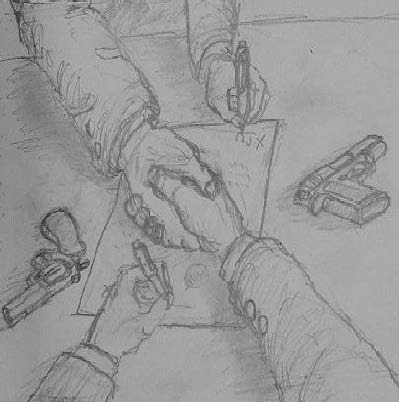
Without question, the legal system is the one facet of society that supposedly requires State provision. Even such champions of laissez-faire as Milton Friedman and Ludwig von Mises believed a government must exist to protect private property and define the rules of the game.
However, their arguments focused on the necessity of law itself. They simply assumed that the market is incapable of defining and protecting property rights. They were wrong.
In this essay, I argue that the elimination of the State will not lead to lawless chaos. Voluntary institutions will emerge to effectively and peacefully resolve the disputes arising in everyday life. Not only will market law be more efficient , it will also be more equitable , than the government alternative.
Just as right-wing hawks embrace the Orwellian notion that War is Peace, left-wing egalitarians believe that Slavery is Freedom. The hawks wage endless war to end war, while the social democrats engage in massive theftor taxation as they call itto eliminate crime.
Font size:
Interval:
Bookmark:
Similar books «Chaos Theory: Two Essays On Market Anarchy»
Look at similar books to Chaos Theory: Two Essays On Market Anarchy. We have selected literature similar in name and meaning in the hope of providing readers with more options to find new, interesting, not yet read works.
Discussion, reviews of the book Chaos Theory: Two Essays On Market Anarchy and just readers' own opinions. Leave your comments, write what you think about the work, its meaning or the main characters. Specify what exactly you liked and what you didn't like, and why you think so.

